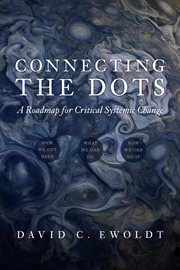Nonfiction
eBook
Details
PUBLISHED
Made available through hoopla
DESCRIPTION
1 online resource
ISBN/ISSN
LANGUAGE
NOTES
Dave's keen intellect, curiosity, and heartbreak about the converging crises threatening life as we know it motivated him to study many fields that he deemed relevant to solving our woes, including systems theory. His serious "dot connecting" began in the early 2000s when he discovered The Natural Systems Thinking Process developed by applied ecopsychology maven Dr. Michael Cohen. Another of Dave's sources for inspiration and information was systems theorist Ervin Laszlo, who explains In The Whispering Pond (1996) that leading edge scientists are now beginning to realize that "there is a constant and intimate contact among the things that coexist and co-evolve in the universe - a sharing of bonds and messages that makes reality into a stupendous network of interaction and communication." It is this 'sharing of messages' in nature that keeps it in balance. By connecting the wisdom of Cohen and Laszlo, Dave started wondering if it could be that the ultimate source of our multitude of life-threatening crises is simply that we as a species have forgotten how to "hear" the messages that nature uses to create and sustain the universe. And thus, the seed of this book was planted. Dave's working title for this book was Connecting the Dots: Reversing Our Handbasket to Hell. Our situation was dire when he passed in December 2018, and since that time our handbasket has only been accelerating toward that flaming destination at an alarming, exponential rate. You are probably well aware that recent events have included an unprecedented frequency and number of monster storms, droughts and wildfires (and now wildfire induced tornadoes and double hurricanes!) as well as innovative new super bugs like Covid-19 that are providing proof that Anthropogenic Global Warming/Catastrophic Climate Destabilization is a major existential danger. At the end of the age of "cheap oil", we're viewing the massive global damage caused by the fossil-fueled capitalist consumption, exploitation and pollution machine and the expensive and existentially threatening global Forever Wars that feed it. We're witnessing the dominator hierarchy's inability to deal with our situation beyond increasing inequality which is fomenting civil unrest and enabling the "election" of a blatant symptom of the systemic disease to the "highest office in the land". Add to all of that the fact that now we're experiencing Great Depression level unemployment and general misery during a once in a hundred years Pandemic. Connecting the Dots provides a greatly needed systemic perspective that begins to answer the most important questions demanding our attention today: "How We Got Here / What We Can Do / How We Can Do It?" In it, Dave constructs a solid, sustainable framework based on natural systems principles that is strong enough to hold a diversity of solutions and endeavors as they evolve in the future. Many readers will be aware of some of the information in this book, but it is the integration of the "dots" that provides the potential for this synthesis to guide and support activists to make swift and long-lasting corrections away from our current trajectory toward collapse toward a sustainable future. The scope of our challenges is broad and deeply embedded in culture, so the solution is multi-faceted-but because the "key" to the framework Dave provides is grounded in how natural systems work, its essence is simple: he guides us to remember how to think and act the way the rest of nature works since Nature has been sustainable for billions of years. The bottom line is to organize a massive, global coalition around a shared vision of sustainability and natural systems principles with non-hierarchical relationships of mutual support and reciprocity at the core
Mode of access: World Wide Web







